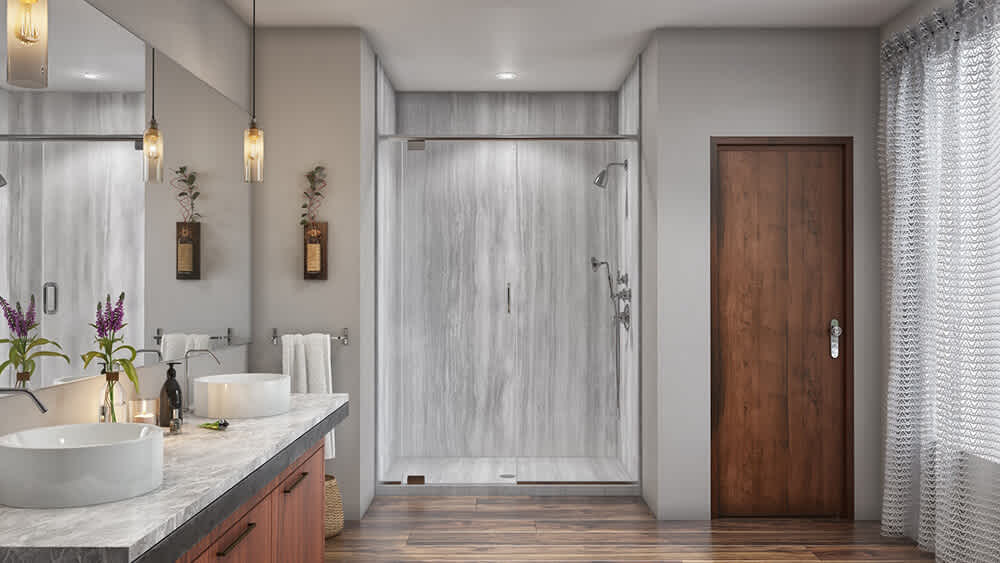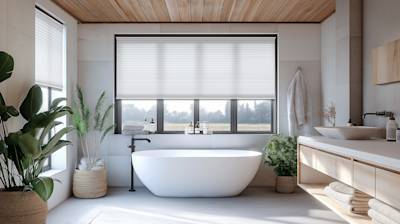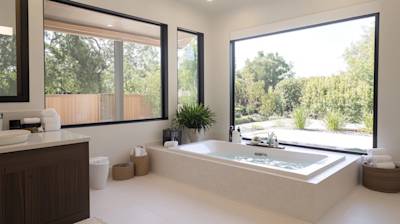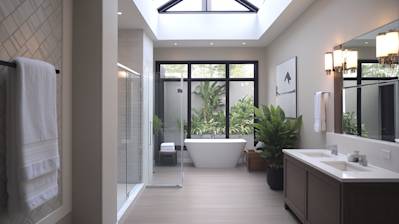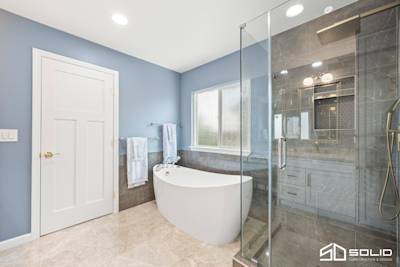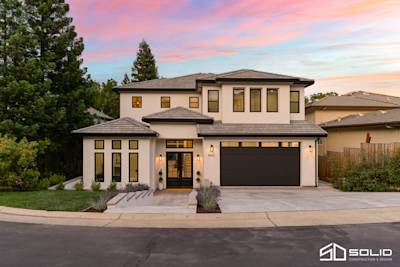Your bathroom should be a spa retreat. It should be a place where you go to relax and de-stress. Part of what makes a bathroom a haven is a stunning shower.
When you're remodeling your shower, you'll have options on what that shower surround can be—but there's no need to be plagued by all the choices.
We'll walk you through how to choose a shower surround that works best for you.
What Is a Shower Surround?
A shower surround is an area above the tub line or the walls surrounding your shower. Because it's just the area around a tub or shower, a surround is made from a few different material options.
These materials vary in terms of what they're made of. However, this variety allows for your bathroom to be customized to your taste and budget. Each material, naturally, has advantages and disadvantages.
Material Options
Just like most home renovation projects, shower surrounds have a few options for the material that's used. No shower surround material's inherently better than another. There is only a material that works best for your needs, reflects your style, and fits your budget.
Shower Surround Kits
These are often found available at most big-box home improvement stores. The material of these varies from kit to kit. Common materials include ABS plastic and PVC.
Some kits will not require to cut or trim the shower surround down to size. However, more expensive kits will require trimming for the shower surround to have a custom look.
Because these kits can include different materials based on the manufacturer, there will be a more detailed guide of the materials in their sections.
Tile
With so many options for color, shape, and size, tile is a popular choice for shower surrounds. Tile often allows for a customized look, allowing you to mix and match and pick out the exact style you want.
Tile has many advantages; it's durable and made to be waterproof, making it a natural option when choosing a shower surround. Not only does tile have many different styles, but it also ranges in price. There are low-cost options and very luxurious, expensive options as well.
This wide range, paired with a variety of styles, means that there is a tile for everyone. Though you may see an expensive tile you love, chances are, there is a similar one at a lower price point.
For all it's benefits, tile has some downsides. It can be very labor-intensive, especially when placing individual tiles.
Another downside to tile is grout, which can be a pain to clean. Because of its porous nature, grout can stain easily. To maintain the look and integrity of a tile shower surround, there is quite a bit of maintenance involved.
Glass
If you love modern design, you probably love a shower surround made of glass.
This sleek material is trending in bathroom design right now. Because it's see-through, it can make a bathroom feel larger and more open. That's great for small spaces.
Glass is often paired with other materials like tile and stone. The tile or stone is on the wall, glass is freestanding or acts as a door.
One major benefit to glass is that it's a material that's easy to clean. Using a squeegee will reveal a sleek surface in no time. Because it's so easy to clean, the chances of mold-build up are much lower than other materials.
However, glass can get expensive because of the thickness required to make the walls. This style of surround doesn't have the seal that other materials require, which can lead to water leaking out of the shower. And a large risk of glass shower surround is the glass shattering.
Stone
Stone is an excellent choice if you're looking to add some texture to your bathroom. Like tile, there are many options for natural stones for a shower surround. Marble, granite, and travertine are just a few examples of stones that have wide variations within their groups.
Stone can offer a similar look to tile while boasting a lower price point. Natural stone is also durable, making it an excellent option for a shower that will get a lot of use.
However, stone is naturally porous. This means that it can absorb moisture or even the soaps and products you use. To combat this, the stone will have to be sealed before installing and resealed throughout the future.
Stone can also be a challenge to clean, taking more time than low-maintenance options like glass and tile. This makes stone a pretty high-maintenance option.
The upkeep may not be for you if you have a busy schedule.
Acrylic and Fiberglass
These are the most affordable options for shower surrounds. Acrylic is thick but lightweight, so it's a great durable material. It's also a smooth surface, so cleaning is a breeze.
Naturally, acrylic is non-porous, so cleaning is simple, and discoloration from products poses no risk. Any surface scratches can be buffed out with polish. However, it can be a hard product for DIY home renovators to work with.
Because of fiberglass' low price, these products are great for those who love to DIY. They are easy to install with tools that you probably already have.
However, fiberglass is thin with a surface that's rough and porous. This can make cleaning difficult, and discoloration becomes a risk.
Solid Surface
Solid surface surrounds are made of different composites often mixed with natural materials. Engineered stones are chips of marble, granite, or quartz mixed with resin to create a polished, smooth surface.
This is a thick material all the way through, so it's durable. They're also non-porous.
Solid surface shower surrounds are also highly customizable, so if you're looking for a way to make your bathroom unique, this is a great option. This material comes in a wide variety of colors and styles, so finding one that fits your design won't be difficult.
For all the benefits you get, you have to pay a premium. Solid surface is the most expensive surround option. These are also not great for a DIY renovator.
A Luxury Shower Around the Corner
With many material options for a shower surround, it can feel like there's too much choice. Breaking down each material option to their pro and cons is the best place to start when making a decision. Then, assess your style, budget, and needs and see which material or materials best meet those criteria.
What shower surround do you want in your next bath remodel? Let us help you create your new luxury shower.

